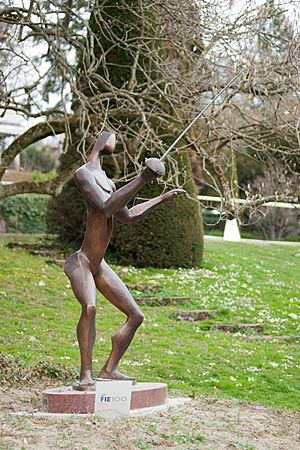International Fencing Federation facts for kids
 |
|
| Sport | Fencing |
|---|---|
| Founded | 29 November 1913 in Paris, France |
| President | |
| Countries | 155 |
| Headquarters | |
The International Fencing Federation, also known as Fédération Internationale d'Escrime or FIE, is the main organization that controls Olympic fencing around the world. Its main office is in Lausanne, Switzerland. The FIE includes 155 national fencing groups. Each of these groups is the official representative for Olympic-style fencing in its country.
Contents
History of the FIE
The International Fencing Federation (FIE) was inspired by a French group called the Société d'encouragement de l'escrime, which started in 1882. This group helped to organize sports globally.
The first international meeting for fencing was held in Brussels, Belgium, in 1897. Another meeting happened in Paris in 1900. At this Paris event, one of the first international fencing competitions took place. Fencers from France, Italy, Spain, and Belgium joined in.
Soon, there were disagreements between fencers who used the épée and those who used the foil. A third meeting in Brussels in 1905 decided to create an international fencing committee. This committee's job was to help fencers become friends, set up national rules, and support fencing competitions. They also decided to use French rules for future international events.
More disagreements came up, this time between France and Italy, about how to hold the fencing weapons. This led to France not participating in the fencing events at the 1912 Olympic Games.
A new international meeting was held in Ghent, Belgium, in July 1913. The main goal was to agree on international rules for each of the three fencing weapons. The French rules were chosen for épée and foil, while Hungarian rules were picked for sabre. During this meeting, a Frenchman named René Lacroix also pushed for the creation of an international fencing federation.

The International Fencing Federation (FIE) was officially started on November 29, 1913, in Paris, France. Nine countries helped create it: Belgium, Bohemia (now the Czech Republic), France, Great Britain, Hungary, Italy, the Netherlands, and Norway. Albert Feyerick, who was the president of the Belgian fencing clubs, became the first FIE president.
The FIE held its first big meeting on June 23, 1914. Seven more countries joined then: Austria, Denmark, Monaco, Romania, Russia, Switzerland, and the United States.
Leaders of the FIE
A wealthy businessman from Russia, Alisher Usmanov, was chosen as the president of the FIE in 2008. He won with 66 votes against the previous president, René Roch, who had 61 votes. Usmanov was re-elected in 2012 and 2016. In 2021, he was re-elected for a fourth time without anyone else running against him.
On February 28, 2022, because of the conflict in Ukraine, the European Union placed restrictions on Usmanov. This meant he could not travel in the EU, and his money there was frozen. The EU said he was a close supporter of Vladimir Putin. After these restrictions, Usmanov announced on March 1, 2022, that he was stepping down as FIE President. He was re-elected to the position on November 30, 2024.
Effects of the conflict in Ukraine
After the conflict in Ukraine began in February 2022, the FIE and the European Fencing Confederation (EFC) decided to ban fencers from Russia and Belarus. They also moved competitions that were planned for Russia and Belarus to other locations.
However, on March 10, 2023, the FIE became the first Olympic sports organization to allow Russian and Belarusian athletes and officials to return. This decision was made in time for them to try and qualify for the 2024 Summer Olympics.
In protest, Denmark, France, Germany, and Poland canceled their upcoming World Cup fencing events. This was to prevent Russian and Belarusian fencers from taking part.
In April 2023, the European Fencing Confederation (EFC) sent a letter to the FIE. They disagreed with the FIE's plan to punish countries that would not give visas to Russian and Belarusian fencers. The EFC also decided in June 2023 that no Russian or Belarusian coach or athlete could compete in EFC events. Russia and Belarus were also suspended as members of the EFC.
More than 200 fencers also signed a letter. They disagreed with the FIE's decision to let Russian and Belarusian fencers compete as neutral athletes. In May 2023, the FIE decided to remove the Olympic qualifier status from individual events at the 2023 European Games in Kraków-Małopolska. This was because Polish organizers did not allow Russians to participate. Instead, the FIE organized a separate European Championships in Plovdiv just for individual events, where Russians were allowed to compete. The Nordic Fencing Union strongly criticized these decisions by the FIE.
Ukrainian champion's disqualification and reversal

In July 2023, Olga Kharlan, a Ukrainian fencer and four-time world sabre champion, was disqualified by the FIE. This happened at the 2023 World Fencing Championships. Kharlan had won her match against Russian fencer Anna Smirnova.
Since July 1, 2020, the FIE had changed its rule about shaking hands after a match. Instead of a handshake, fencers were supposed to give a "salute" by tapping blades. Handshakes were "suspended until further notice."
After Kharlan won, Smirnova offered her hand. Kharlan instead offered her saber for a blade tap. Kharlan said her salute was a sign of respect, but also showed awareness of the ongoing conflict between Ukraine and Russia. Smirnova protested and sat on the fencing strip for 45 minutes. Because of this, Kharlan was given a black card, which meant she was disqualified from the championship. The Russian fencer had been allowed to compete as a neutral athlete.
The Ukrainian team appealed the decision. The German Fencing Federation also criticized the FIE's choice. They felt that strictly following the rules in this situation sent a bad message.
Many people criticized the FIE for its decision. Ukrainian tennis player Elina Svitolina said the disqualification was "disrespectful" to Ukrainians. Mykhailo Podolyak, an advisor to Ukraine's president, called the FIE's decision "absolutely shameful." He shared a photo that seemed to show the Russian fencer smiling with a Russian soldier. He wrote that the FIE disqualified the Ukrainian fencer for not shaking hands with someone who openly admired the Russian army. Kharlan herself said, "This federation will never change." The head coach for Team USA, Yury Gelman, called the FIE the most corrupt federation in the world.
The International Olympic Committee (IOC) strongly disagreed with the FIE's actions. On July 28, at the request of the IOC, the FIE changed its mind and canceled Kharlan's disqualification. This allowed her to compete in the team women's sabre event on July 29. However, the FIE still said that the original penalty was correct according to its rules.
The IOC also sent a supportive letter to Kharlan. They told her that because of the situation, she would automatically qualify for the 2024 Paris Olympics. The IOC promised to continue supporting Ukrainian athletes. After this, Bruno Gares, an FIE official, said that handshakes would become optional after a match, and a distant greeting would be allowed instead.
FIE Competitions
The FIE organizes many fencing competitions. These include:
- The senior World Championships and World Cup.
- The Junior World Championships and Junior World Cup for younger fencers.
- The Cadets World Championships for even younger fencers.
- The Veterans World Championships for older fencers.
The FIE also helps the International Olympic Committee organize fencing events at the Summer Olympics. There has been some debate between the FIE and the IOC about the number of fencing events at the Olympics. Since women's sabre was added at the 1999 World Fencing Championships, the World Championships have twelve events: individual and team events for each of the three weapons (foil, épée, sabre) for both men and women.
However, the IOC does not want to give more Olympic medals to fencing. So, the FIE decided to have all six individual events at the Olympics. But for team events, only four are chosen, and they rotate which ones are included. The two team events that are not at the Olympics are instead part of the World Championships.
FIE Presidents
Here is a list of the presidents of the FIE since it started in 1913:
- 1913–21: Albert Feyerick
- 1921–24: André Maginot
- 1925–28: George van Rossem
- 1929–32: Eugène Empeyta
- 1933–48: Paul Anspach
- 1949–52: Jacques Coutrot
- 1953–56: Giuseppe Mazzini
- 1957–60: Pierre Ferri
- 1961–64: Miguel de Capriles
- 1965–80: Pierre Ferri
- 1981–84: Giancarlo Brusati
- 1984–92: Rolland Boitelle
- 1993–2008: René Roch
- 2008–22: Alisher Usmanov
- 2022–date: Emmanuel Katsiadakis (interim president)
FIE Member Countries
As of 2023, the FIE recognizes 155 national fencing groups from different countries. These groups are organized into five main areas: Africa, America, Asia, Europe, and Oceania.
| Africa (CAE) | America (CPE) | Asia (FCA) | Europe (CEE) | Oceania (OFC) |
|---|---|---|---|---|
|
|
|
|
|
|
See also
 In Spanish: Federación Internacional de Esgrima para niños
In Spanish: Federación Internacional de Esgrima para niños
 | Percy Lavon Julian |
 | Katherine Johnson |
 | George Washington Carver |
 | Annie Easley |



